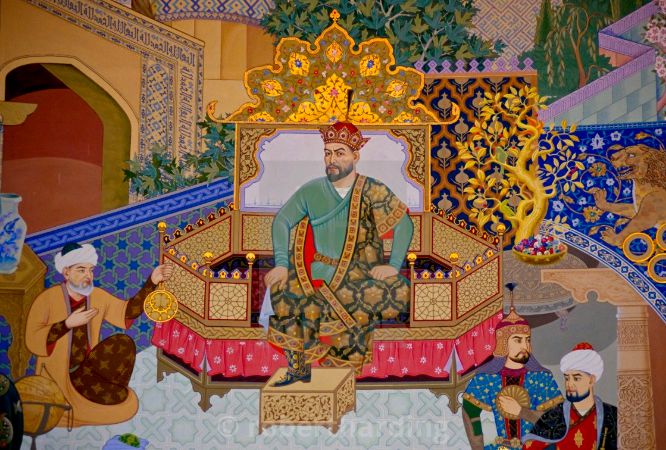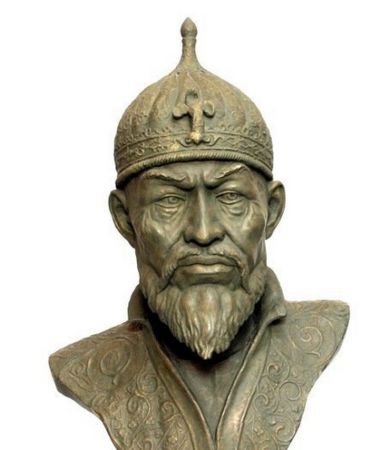He was illiterate, but a very skilled warrior: who is Tamerlane?
Timur built an empire that expanded from China in the east to eastern Anatolia in the west, from Moscow in the north to the Strait of Hormuz and Delhi in the south, in about thirty years.

There is different information in the sources about the date and place of birth of Timur, one of the greatest conquerors of history. While historian Şerefüddin Ali Yezdî records that Timur was born in 1336 in the city of Uzbekistan, formerly known as Keş, the current name is Shahrisebz, Ibn Tagriberdi records that Timur was born in 1328 in the village of Hoca Ilgar, connected to Keş.
Timur was the son of Turagay and Tekine Hatun, who were members of the Barlas tribe.
His father, Taragay Bahadır, was a very religious person who avoided political affairs and devoted himself to worship. Taragay, who spent most of his time chatting with the clergy, left the management of the Barlas Tribe to his relative Emir Hacı Barlas. Although there is not much information in the sources about Timur's mother, Tekine Hatun, it is known that she belonged to a noble family.
Timur or Tamerlane (9 April 1336 – 17–19 February 1405) was a Turco-Mongol conqueror who founded the Timurid Empire in and around modern-day Afghanistan, Iran, and Central Asia, becoming the first ruler of the Timurid dynasty. An undefeated commander, he is widely regarded as one of the greatest military leaders and tacticians in history, as well as one of the most brutal. Timur is also considered a great patron of art and architecture as he interacted with intellectuals such as Ibn Khaldun, Hafez, and Hafiz-i Abru and his reign introduced the Timurid Renaissance.
Timur's real name comes from the Turkish word Temür, that is, iron, Persians call it Timur-i Leng, while Europeans call it Tamerlane. In the sources, Timur is described as tall, imposing body, broad shoulders, a large head, and a wide forehead. His hands and feet were large, and his arms and legs were quite long and thick. Timur, whose appearance was strange and frightening, had a very sullen face, paralyzed right hand, and lame right foot. He was nicknamed “Lenk” (lame) when he was shot in the shoulder and hip by a shepherd while he was stealing sheep on one of the days when he was crossing the road and committing a crime. Ibn Khaldun states that, as Timur told him, he received this arrow wound, which caused him to be lame, during a raid he made in his youth.

Timur, who had reddish-white skin, shining eyes, and a long and straight beard, had a very strong voice. Timur, who was strong and very agile even in his seventies, did not feel the need to stand anywhere while sitting and getting up and never showed his real age. Because of his lame right leg, Timur, who walked short distances by dragging his leg and was carried long distances by his men, was put on his horse by being taken on the shoulders of his men when he wanted to ride.
Timur's first rise to the fore in the field of politics was with the campaign of Çağatay Han Tuğluk Timur to Transoxiana in 1360. After the murder of Emir Kazagan, Tuğluk Timur evaluates the authority vacuum and takes action to take the region under his control. When Tuğluk Timur began to take Transoxiana under his control, many emirs, including Hacı Barlas, who assumed the management of the Barlas Tribe, began to flee the region. This would be a great opportunity for Timur. Timur, who declares his loyalty to Tugluk Timur, is given the command of the Keş division consisting of 10,000 people, together with the management of the Keş region.
After this development, Timur goes to his brother-in-law, Emir Hüseyin, who left Samarkand and retreated to the desert, joins him, and starts to fight together with İlyas Hodja. When they defeated İlyas Hoca, who became the head of the state after the death of Tuğluk Timur in 1363, in the war in 1364, they began to be seen as heroes by the people. However, when İlyas Hoca defeated Timur and Emir Hüseyin in the Mud War a year later, the defeated couple retreated to the city of Belh. However, İlyas Hodja encounters unexpected resistance in the besieged Samarkand; He has to return to his country with the effect of the epidemic that started in the riding animals. Thereupon, Emir Hussein and Timur return again; The ties between the two, who captured Samarkand and Transoxiana, soon came to a head when Timur could not accept being the second man, and the kinship ties ended with the death of his wife Olcay Türkan. Timur, besieging the city of Belh, where Emir Hussein is located, has Emir Hussein and his two sons killed after capturing the city. Timur, after ten years of struggle, takes the title of Great Emir in 1370 and sits on the throne in Samarkand.
After Timur completely took Transoxiana under his control, on the one hand, he reconstructed the region that was damaged due to the turmoil that lasted for many years, on the other hand, he organized successive expeditions to the Mongols, the Khwarezm Region, and the Golden Horde State in order to rebuild the Chagatai Khanate. By 1380, Timur, who had completely dominated Transoxiana, turned his direction to the west. He dominates Iran, Iraq, Georgia, Azerbaijan, and Eastern Anatolia with the expeditions he organizes.
In 1398, he took the Indian subcontinent, especially Delhi, under his control with the Indian expedition. It is clearly known that his main aim is to establish political and military dominance in this geography by making the religion of Islam dominant throughout India. Timur, who spent fifteen days in Delhi, succeeded in taking away the thrones by ending the sovereignty of the Indian sultans. During the Indian campaign, Timur, whose horses were afraid of the elephants in the Indian army and whose army was about to be defeated, had triangular forks made of iron and had them thrown on the path of the elephants at night. The elephants stepping on these forks are frightened by the pain and turn back, crushing their own men and causing them to be defeated.
Thus, in about thirty years, Timur built an empire that expanded from China in the east to eastern Anatolia in the west, from Moscow in the north to the Strait of Hormuz, and Delhi in the south. On the one hand, while the borders expand and become richer economically, on the other hand, alliances against Timur begin to be formed between the rulers who lost their lands and the rulers who saw Timur as a danger.
Timur embarks on the Anatolian Expedition one year after the Syria Campaign. He inflicted a heavy defeat on the Ottomans in the war in Ankara's Çubuk Plain in 1402 and caused the Ottoman Empire to enter the Interregnum Period (1402-1413).
Timur, who was illiterate but spoke Turkish, Persian, and especially Mongolian very well, loved science and scholars very much and did not fail to respect them. Timur took care of all craftsmen and professionals, regardless of the size or smallness of his work. While doing this, he only cared whether the work was useful or not. For this reason, he would take the scholars, professionals, and craftsmen in the countries and cities he conquered with their families to the capital city of Samarkand and do his best to practice their arts there. For this reason, Samarkand became one of the most beautiful cities of the period.
Timur had another interesting feature: He gathered scholars, put forward the problems that seemed to have no solution and talked about some general things about that subject that those present thought that Timur had read this science. Then he would order the scholars to discuss the issue and trouble them with his questions. He usually did this with the aim of torturing and killing scholars in the cities he conquered.
Sources state that Timur does not like humor, entertainment, music, and poetry and that he does not like those who are interested in them, and that he likes a beautiful voice and drinking wine. Timur, who had no tolerance for indiscipline and did not forgive the slightest mistake, did not like jokes and kept his seriousness towards everyone far and close.
Timur, who never gave up on truth even if it hurt himself, and hated lying and lying, had the phrase "rastî rusti (salvation is in truth)" engraved on his ring and left his stamp containing the same phrase at the end of his letters, how important it is to truthfulness. It was a sign of giving. At the same time, this ruler, who had a serious, determined, tough, and authoritative personality, would definitely do anything he set his mind to and wanted his orders to be strictly fulfilled. He considered the blood of anyone who had the slightest opposition to his order permissible, and nothing could deter him from his decision.
Timur, who had a really great knowledge of horses, could recognize horses by their insignia and distinguish between good and bad at a glance.
Historians have different opinions about Emir Timur, who established a great Turkish-Islamic state centered in Samarkand in 1370 and expanded his dominance from Transoxiana to Iraqi Acem, Iraqi-Arab, Azerbaijan, Armenia, Erzincan, Georgia, and Moscow in a short time. Some historians who grew up in his palace raise him to the skies, while others knock him down. It is seen that Timur, who strictly adhered to the religion of Islam and ruled his state based on religious provisions and Sharia laws, was always intertwined with the ulema and consulted and negotiated in the palace conversations.
Timur, whose expeditions had consequences that would affect the fate of not only the geography he dominated but also the history of the world, died at the age of 79 in Otrar on his way to China in 1405. He was brought to Samarkand and buried in the madrasa of his deceased grandson, Muhammed Sultan, near Ruh Abad. Timur's 4 sons and 2 daughters were born to his 9 wives. But at the time of his death, only two of his sons were alive. Among them, Miranshah was the chief of these regions in Baghdad and Azerbaijan. His other son, Shahruh, was ruling Khorasan on behalf of his father.
